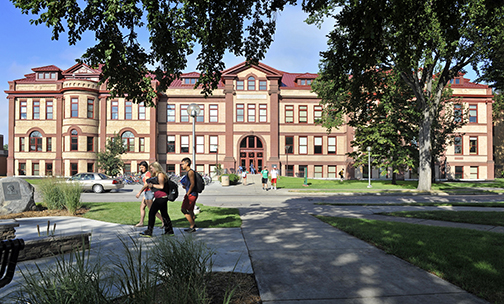The Department of Sociology and Anthropology offers a Master of Science (M.S.) and Master of Arts (M.A). degree in Anthropology. The program centers on human cultural diversity past and present, and is based on the principle that graduate level education in Anthropology is a desirable preparation for a growing number of career orientations. The precise plan of study for each student is established in consultation with the academic adviser. Graduate students are also expected to enhance their course work and degree research by engaging in professional development activities such as paper or poster presentations and/or attendance at academic conferences, campus and community service, and teaching and research assistantships. Our graduates have gone on to pursue careers in cultural resource management, tribal historic preservation, university and college teaching, museum work, international studies administration, National Park Service archaeology, not-for-profit program event coordination management, and research analysis as cultural experts.
The focus of graduate education in Anthropology is directed toward both the development of applied anthropologists and the advanced training of those seeking to pursue a doctoral degree. Students may elect to take courses in a specialty area, or they may pursue a background in general anthropology. Areas of specialization include medical and psychological anthropology, cultural anthropology, historical archaeology, and Indigenous archaeology.
The Anthropology graduate program provides students with the opportunity to expand their background and perspectives in research methods and theory. Consequently, the first year of the program is designed to expose students to anthropological theory and a variety of research methods.
Three program options are available for students. In the thesis option (Plan A), students work on a research-based thesis. Students typically test theoretical assumptions using primary or secondary data. The comprehensive study option (Plan B) is designed for students who wish to pursue an applied topic of study. Students electing this option are required to complete a comprehensive study paper. The culminating experience option (Plan C) requires a final examination in place of a thesis or paper.
Students in the Anthropology graduate program benefit from a favorable faculty-to-student ratio.
Financial Assistance
Teaching assistantships are available to qualified applicants. Research assistantships may also be available, contingent on faculty research funds. Applicants for assistantships are considered on the basis of scholarship and potential to undertake advanced study and research. To be considered for an assistantship, a completed graduate admission application, official transcripts, and three letters of reference must be received by the Graduate College no later than February 1.
In addition to the stipend, graduate assistants receive a graduate tuition waiver. Tuition waivers cover base tuition for NDSU graduate credits only. Students are responsible for differential tuition, student fees, and tuition for non-graduate level credits taken or Cooperative Education credits.
The Anthropology graduate program is open to qualified graduates from universities and colleges of recognized standing. To be admitted with full standing to the program, the applicant must meet the Graduate School's requirements and have adequate preparation in anthropology.
Students will write a master's thesis (Plan A), complete a comprehensive study paper (Plan B), or pursue a culminating experience (Plan C). The student's schedule of courses must be approved by the faculty adviser.
The Master of Arts or Master of Science in Anthropology thesis option (Plan A) requires a minimum of 30 credits, including16 didactic credits. Plan B and C options require a minimum of 30 credits, including 21 didactic credits.
Thesis (Plan A) and Master's Paper (Plan B) Options
Course List | Code | Title | Credits |
| 3 |
| 3 |
| 8-15 |
| 4-8 |
| Master's Thesis | |
| Master's Paper |
Comprehensive Study (Plan C) Option
Course List | Code | Title | Credits |
| 21 |
| 9 |
| Total Credits | 30 |
Additional coursework can include additional examination credits (ANTH 797), Field Experience (ANTH 695/795), Practicum (ANTH 794), and/or additional didactic courses in the student's area of study.
John L. Creese, Ph.D.
University of Toronto, 2011
Research Interests: Collaborative Indigenous Archaeology, Spatial Analysis, Household and Settlement Archaeology, Material Culture, Theory, North America and Great Lakes
Kristen R. Fellows, Ph.D.
University of Pennsylvania, 2013
Research Interests: Anthropological Archaeology, Historical Archaeology, Ethnohistory, African Diaspora, Archaeology of Plantations; Colonial Encounters; Globalization and Transnationalism; Feminist Archaeology, the Caribbean; North America
Ellen B. Rubinstein, Ph.D.
Yale University, 2012
Research Interests: Medical and Psychological Anthropology, Diagnosis, Disability, Care, Aging, Family, U.S. Primary Care, Cancer Survivorship, Japan

